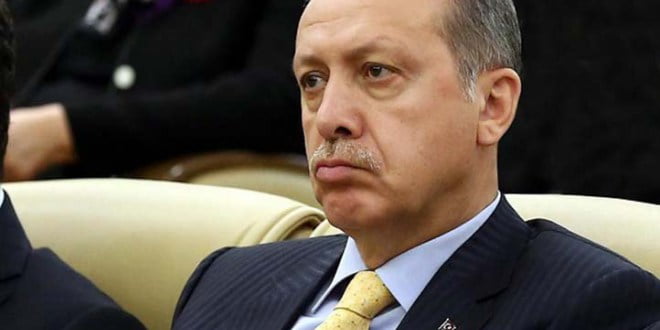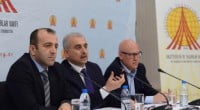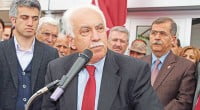Turkey’s permanent state of crisis

Date posted: December 21, 2016
Soner Cagaptay
President Recep Tayyip Erdogan is the most powerful person in Turkey in almost a century, rivaled only by Ataturk — the secular founder of the republic. Erdogan first assumed power as prime minister in 2003, and in 2014 he won elections to become president. After already having controlled Turkey for almost 14 years, Erdogan now wants to amend the Turkish constitution so that he can become head of state, head of government and head of the ruling Justice and Development Party (AKP), amassing as much power as Ataturk once held.
Ataturk, who liberated Turkey at the end of World War I and then established a republic out of the ashes of the Ottoman Empire, ran Turkey with an iron grip between 1923 and 1938. A Jacobin politician, Ataturk shaped Turkey in his image as a secular Western society. Importantly, Ataturk did not eliminate religion. Rather, he created a secularist system that essentially controlled religion and marginalized citizens who defined their identity first and foremost through religion.
Erdogan has dismantled Ataturk’s secularism in just over a decade and has done so with little mercy for his opponents. He has flooded the country’s political and education systems with rigidly conservative Islam. Following changes to Turkey’s secular education system, a growing number of pupils have been forced to study in publicly funded Islamic high schools. No one is spared — not even the grandson of Turkey’s chief rabbi. Students’ placements in Islamic schools are no longer by choice, but rather by state mandate.
By providing economic growth and bringing Turkish incomes within reach of Europe’s, Erdogan has come closer to Ataturk’s dream than any other Turkish leader. If he can temper his political agenda, Erdogan will go down in history as one of Turkey’s most memorable and influential leaders. If not, he will be remembered as the Turkish leader who drove his country into the ground. The choice is Erdogan’s to make.
Put in simple terms, just as Ataturk engineered Turkey’s sociopolitical landscape, Erdogan, too, wants to transform Turkey top-down, but as a deeply Muslim society. The end product is that Turkey discriminates against citizens who do not affix their identity to the conservative Sunni Islam that Erdogan practices.
However, Erdogan has a problem: Whereas Ataturk came to power as a military general, Erdogan has a democratic mandate to govern. Ataturk’s Turkey was rural and only 10 percent of the country was literate at the time, with most educated people supporting his agenda. Erdogan’s Turkey is 80 percent urban and nearly 100 percent literate, and many well-educated Turks oppose his agenda.
Even more important, whereas half of the country adores Erdogan, the other half loathes him. Erdogan has repeatedly won democratic elections through the AKP, but meanwhile has also built a cult of personality as an authoritarian underdog, portraying himself as a victim who is forced to crack down harshly on those whose “conspiracies” undermine his authority.
Erdogan has intimidated the media and the business community through politically motivated tax audits and by jailing dissidents, scholars and journalists, and his police have made a habit of cracking down on peaceful opposition rallies. Erdogan’s electoral strategy has escalated polarization in Turkey. His conservative base, constituting nearly half of the country, has zealously banded around him in his defense, but the other half of the country — including leftists, social democrats, liberals, secularists, Alevis (who are liberal Muslims) and Kurds — holds a profound resentment for him. Increasingly, there is little common ground between these constituencies.
Herein lies the permanent crisis into which Erdogan’s agenda has thrown Turkey. As Erdogan moves forward to make himself executive-style president, half of the country will never embrace his agenda. Even more worrisome in this crisis, the country is torn, with the pro- and anti-Erdogan blocs’ hatred for each other overshadowing their fear of terrorist attacks by the Islamic State or the Kurdistan Workers’ Party (PKK).
Each new PKK and Islamic State attack drives a wedge deeper into Turkish society. When the PKK attacks, the pro-government bloc blames the opposition; when the Islamic State attacks, the opposition blames the government. For instance, after a PKK attack on off-duty soldiers, which killed 14 people in the central Anatolian city of Kayseri, pro-government mobs firebombed branches of the pro-Kurdish opposition Peoples’ Democratic Party (HDP) all over the country. Similarly, in the wake of the July 2015 Islamic State attack in Suruc, which killed 32 people, protesters blamed the government for failing to stop it. The Islamic State and the PKK, whose affiliate Kurdistan Freedom Falcons (TAK) claimed responsibility for the twin bombing in Istanbul on Dec. 10 that killed at least 29 people, will only further exploit this crisis.
The war in Syria will spill into Turkey, as evidenced by the politically charged assassination of the Russian ambassador to Turkey on Monday by an off-duty police officer who screamed “Don’t forget Aleppo! Don’t forget Syria!” The country faces a toxic cocktail of political polarization and threats of violence that could erupt into a catastrophe. I have generally been an optimist about Turkey, but these days, I’m worried.
I believe that Erdogan wants to make Turkey a great power. Ataturk’s answer to loss of Ottoman greatness was authoritarian secularism: He made Turkey more European than Europe itself in order to cast his country as a resilient nation. Erdogan’s answer has been to use Islam and authoritarianism, a strategy that threatens to break modern Turkey.
Nevertheless, by providing economic growth and bringing Turkish incomes within reach of Europe’s, Erdogan has come closer to Ataturk’s dream than any other Turkish leader. If he can temper his political agenda, Erdogan will go down in history as one of Turkey’s most memorable and influential leaders. If not, he will be remembered as the Turkish leader who drove his country into the ground. The choice is Erdogan’s to make.
Soner Cagaptay is a senior fellow at the Washington Institute for Near East Policy. Follow @SonerCagaptay
Source: Washington Post , December 20, 2016
Tags: Democracy | Terrorism | Turkey |
























